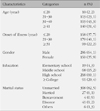1. Ahn JS. A study on the effects of peer relationships of mentally disabled people in community on their empowerment. Daegu: Keimyung University;2006. Unpublished master's thesis.
2. Bae JG. Attitude of recovery and quality of life persons with psychiatric disabilities. Daegu: Keimyung University;2004. Unpublished doctoral dissertation.
3. Bae SW, Kim YY. A longitudinal examination of the effects of community mental health services provided by a psychosocial rehabilitation center on the quality of life outcomes for the mentally ill. Ment Health Soc Work. 2005; 20:69–94.
4. Bracke P. Measuring the subjective well-being of people in a psychosocial rehabilitation center and a residential psychiatric setting. Psychiatr Rehabil J. 2001; 24(3):222–236.

5. Choi JW, Hong JP, Kim CY, Lee C, Han OS. Quality of life in the first admitted schizophrenic patients: A retrospective follow-up study. J Korean Neuropsychiatr Assoc. 1997; 36(6):987–996.
6. Choi MM, Lee KY, Eom TW. Differences in empowerment and the quality of life among the users of the mental health service settings in Korea. Ment Health Soc Work. 2006; 24:94–124.
7. Choi MO. The effects of the self-advocacy program for the mentally ill to reinforce the empowerment. Busan: Busan National University;2002. Unpublished Master's thesis.
8. Choi YJ, Choi SS. A study on the recovery attitude and factors affecting the recovery attitude in mentally disabled. Ment Health Soc Work. 2007; 26:111–143.
9. David AS. Insight and psychosis. Br J Psychiatry. 1990; 156:798–808.

10. Durbin J, Perndergast P, Dewa CS, Rush B, Cooke RG. Mental health program monitoring: Towards simplifying a complex task. Psychiatr Rehabil J. 2003; 26(3):249–261.

11. Jung DJ. The study on the effectiveness of the empowerment practice perceived by the people with mental disorder. Seoul: Catholic University of Korea;2005. Unpublished Master's thesis.
12. Kang DG. Analysis of motivation for change of the person with psychiatric disabilities and effectiveness of motivation improvement program. Daegu: Kyungpook National University;2007. Unpublished doctoral dissertation.
13. Kang DG, Kim YY. The utilization level of psychosocial rehabilitation centers and their insight and rehabilitation outcomes. Korean Community Ment Health J. 2005; 8:45–59.
14. Kilian R, Lindenbachb I, Löbig U, Uhlea M, Petscheleita A, Angermeyera MC. Indicators of empowerment and disempowerment in the subjective evaluation of the psychiatric treatment process by persons with severe and persistent mental illness: A qualitative and quantitative analysis. Soc Sci Med. 2003; 57(6):1127–1142.

15. Kim MH. A study on the effect of empowerment on job satisfaction and job involvement of people with mental disorder. Seoul: Kangnam University;2006. Unpublished master's thesis.
16. Kim SH. The effects of family support and stress coping strategy on chronic schizophrenia patient's quality of life. Gwangju: Chonnam National University;2002. Unpublished master's thesis.
17. Kim YY. The integrated psychiatric rehabilitation services and their impact on rehabilitation outcomes and quality of life. Daegu: Keimyung University;2004. Unpublished doctoral dissertation.
18. Kim YY. A study on the relationship between rehabilitation motivation and rehabilitation outcome for the mentally ill. Korean J Clin Psychol. 2006; 25(3):623–637.
19. Kim YY, Back YM, Park HS. The effect of self-efficacy and problem solving capacity on rehabilitation outcomes in patients with schizophrenia. J Korean Acad Psychiatr Ment Health Nurs. 2008; 17(3):322–331.
20. Kim YY, Bae SW. The utilization level of psychosocial rehabilitation centers and its impact on the rehabilitation outcomes for the mentally ill. J Soc Welf Res. 2005; 6(1):27–50.
21. Kim YY, Park HS, Bae SW. The effects perspective-oriented social skills training on function and symptom for persons with schizophrenia. J Korean Acad Psychiatr Ment Health Nurs. 2008; 17(2):140–150.
22. Kim YY, Park HS, Park KM. The effects of recovery education program on rehabilitation motivation, symptoms, and function for schizophrenic patients. J Korean Acad Nurs. 2006; 36(3):542–550.

23. Lee YP. Effects of community mental health programs on rehabilitation outcomes for persons with mental illness. Seoul: Seoul National University;2000. Unpublished doctoral dissertation.
24. Lee YR. A study on the factors predicting on social integration of the mental disorders in social rehabilitation facilities. Seoul: Ewha Womans University;2001. Unpublished doctoral dissertation.
25. Munro BH. Statistical method for health care research. Philadelphia, PA: Lippincott Williams & Williams;2005.
26. Park HS, Bae SW, Kim YY. The effects of psychosocial rehabilitation programs on the levels of self-efficacy for mentally disabled persons. J Korean Acad Nurs. 2008; 38(5):704–711.

27. Parsons RJ. Assess helping client outcomes in empowerment practice: Amplifying client voice and satisfying funding source. In : Shera W, Wells L, editors. Empowerment practice in social work: Developing richer conceptual foundations. Toronto, CA: Canadian Scholars Press;1999. p. 390–417.
28. Son MJ, Park DG, Choi YH, Lee SH, Bae JK. A study on the development of functional assessment scale for persons with psychiatric disability. Korean J Clin Psychol. 2001; 20(4):731–749.
29. Staple LH. Powerful ideas about empowerment. Adm Soc Work. 1990; 14(2):29–42.

30. Wilkinson G, Hesdon B, Wild D, Cookson R, Farina C, Sharma V, et al. Self-report quality of life measure for people with schizophrenia: The SQLS. Br J Psychiatry. 2000; 177:42–46.







 PDF
PDF ePub
ePub Citation
Citation Print
Print







 XML Download
XML Download